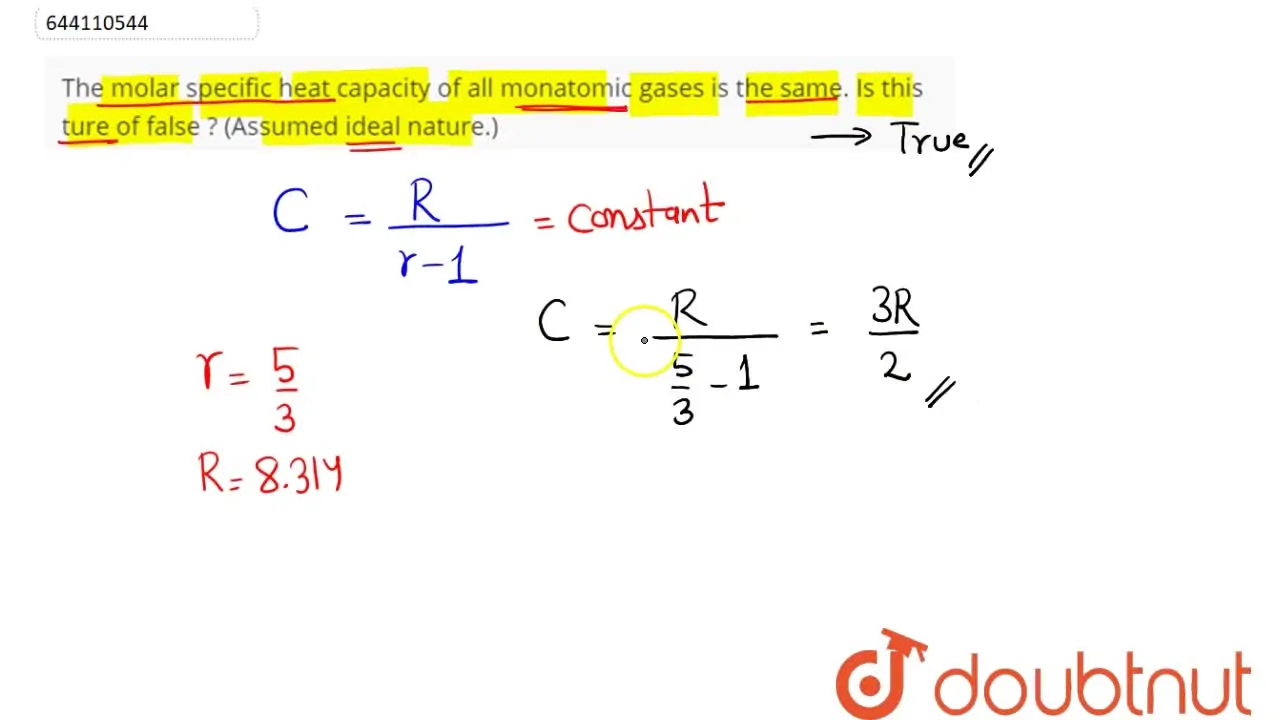The molar specific heat capacity of all monatomic gases is the same. Is this ture of false ? (Assumed ideal nature.)
Video Solution
Text Solution
Ture. The molar specific heat capacity is given by
C=Rγ−1
R is a universal constant and γ is the same for all monoatomic gases, and hence the molar specific heat capacity of all monoatomic gases is the same.
|
Updated on:21/07/2023
Related Playlists
- BOOK - CENGAGE PHYSICS ENGLISHCHAPTER - KINETIC THEORY OF GASES AND FIRST LAW OF THERMODYNAMICSEXERCISE - Exercise 2.228videos
KINETIC THEORY OF GASES AND FIRST LAW OF THERMODYNAMICS
- BOOK - CENGAGE PHYSICS ENGLISHCHAPTER - KINETIC THEORY OF GASES AND FIRST LAW OF THERMODYNAMICSEXERCISE - Subjective22videos
KINETIC THEORY OF GASES AND FIRST LAW OF THERMODYNAMICS
- BOOK - CENGAGE PHYSICS ENGLISHCHAPTER - KINETIC THEORY OF GASES AND FIRST LAW OF THERMODYNAMICSEXERCISE - Solved Examples14videos
KINETIC THEORY OF GASES AND FIRST LAW OF THERMODYNAMICS
- BOOK - CENGAGE PHYSICS ENGLISHCHAPTER - KINETIC THEORY OF GASESEXERCISE - Compression2videos
KINETIC THEORY OF GASES
- BOOK - CENGAGE PHYSICS ENGLISHCHAPTER - LINEAR AND ANGULAR SIMPLE HARMONIC MOTIONEXERCISE - Single correct anwer type14videos
LINEAR AND ANGULAR SIMPLE HARMONIC MOTION
Similar Questions
The specific heat capacity of water is :
View SolutionSpecific heat capacity of water is
View SolutionThe specific heat capacity of a body depends on
View SolutionThe molar heat capacity for an ideal gas
View SolutionWhat is the specific heat ratio of monoatomic gases ?
View SolutionWhat is the specific heat ratio of diatomic gases ?
View SolutionThe S.I. unit of specific heat capacity is :
View SolutionWhat is the specific heat ratio of triatomic gases ?
View SolutionThe ratio of specific to molar heat capacity of a body
View SolutionThe heat capacity of a diatomic gas is higher than that of a monatomic gas.
View Solution


